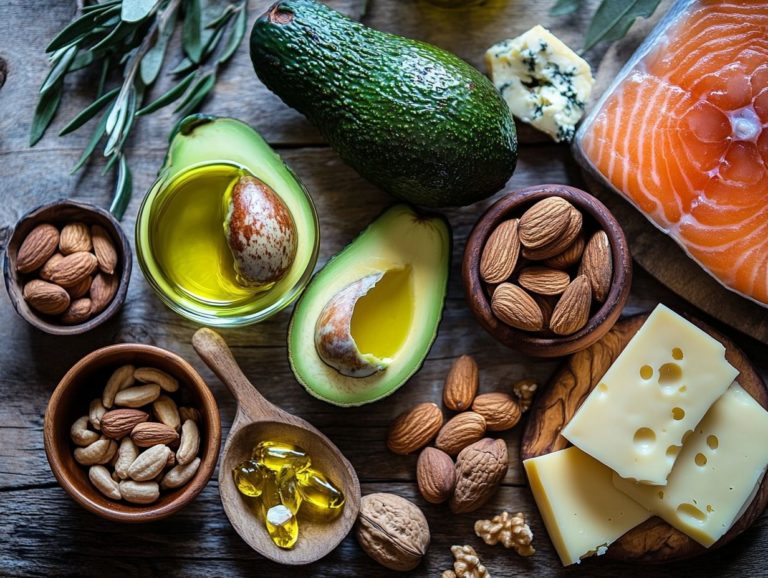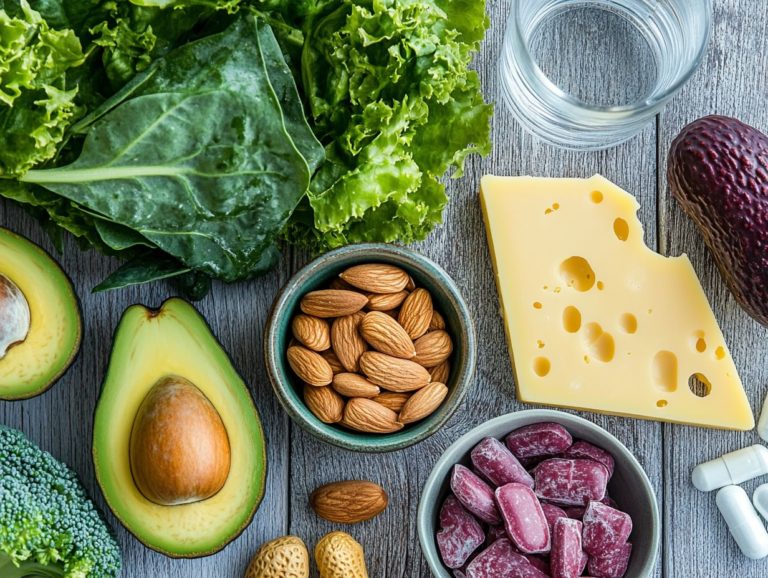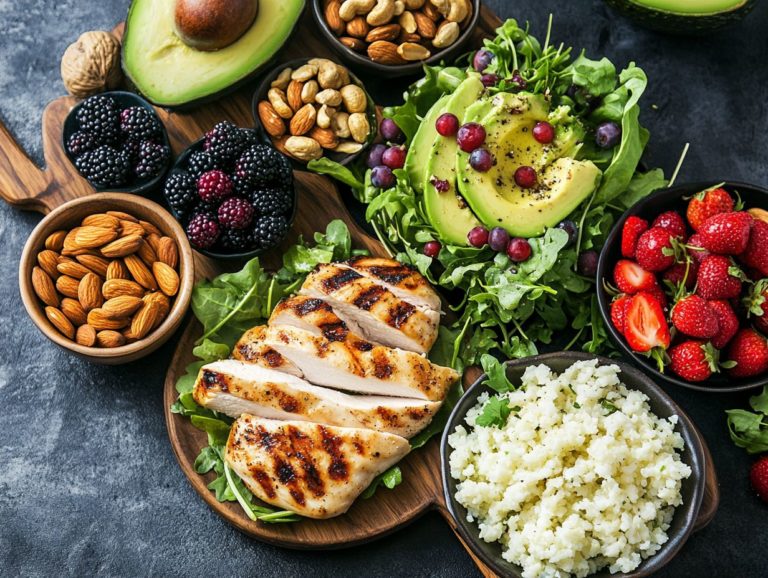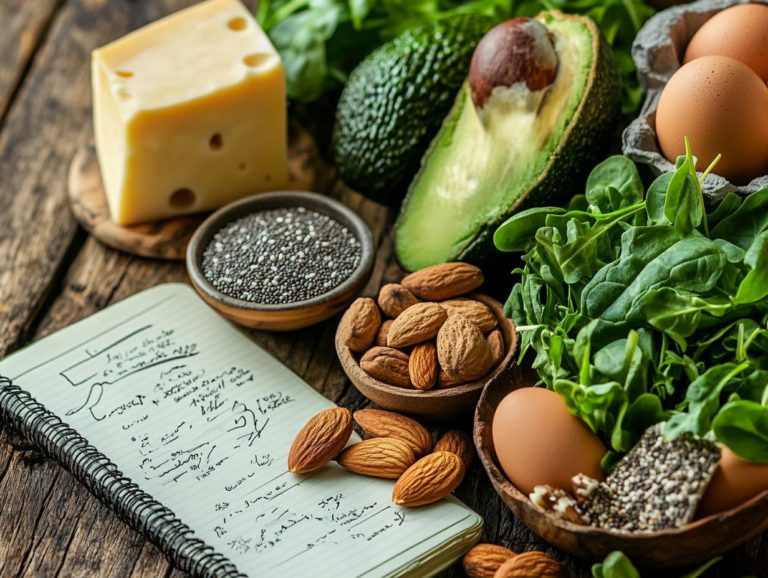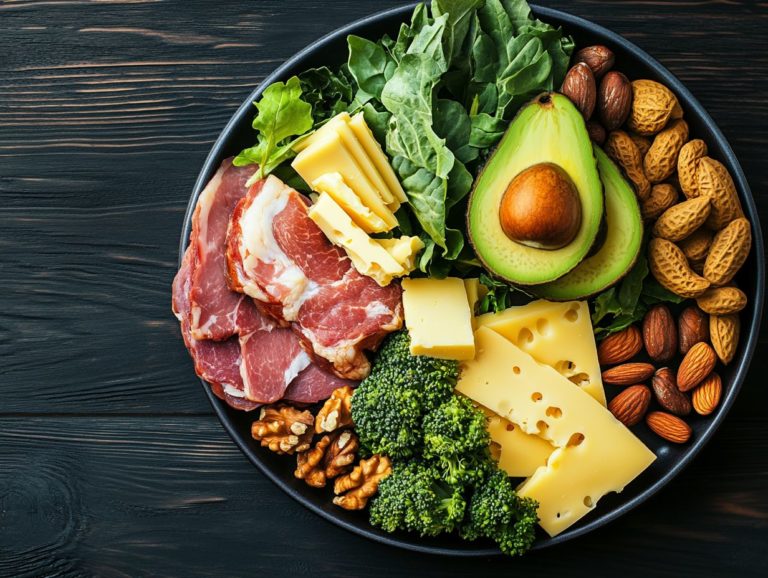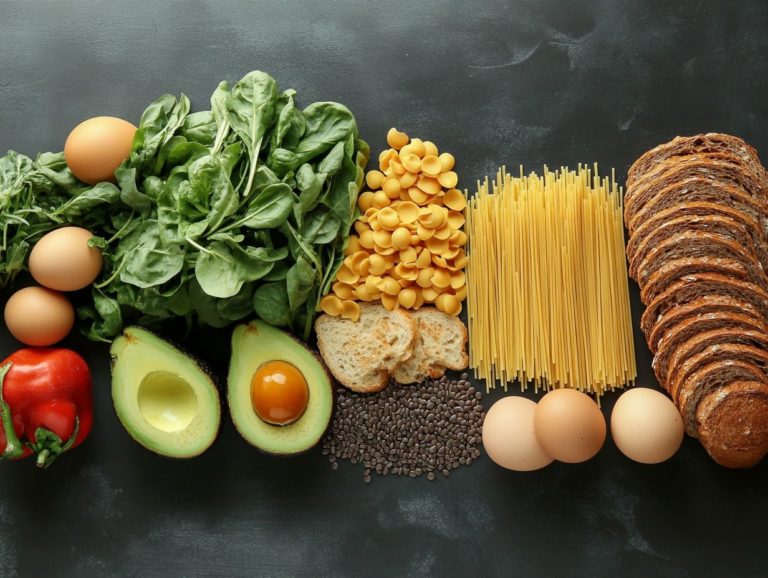Keto and Nutritional Adjustments for Weight Loss
The keto diet has surged in popularity as a potent strategy for weight loss and obesity treatment. But what does it truly involve? This article delves into the core principles of the ketogenic diet, revealing how it facilitates fat metabolism and the critical nutritional adjustments necessary for your success.
You ll discover which foods to embrace and which to steer clear of. All while exploring the potential benefits and adverse effects tied to this low-carb lifestyle. Whether you’re contemplating the keto diet or simply intrigued by its glucose metabolism and fat metabolism mechanisms, you’ll find valuable insights to illuminate your journey.
Contents
- Key Takeaways:
- What is the Keto Diet?
- How Does the Keto Diet Work for Weight Loss?
- What Are the Nutritional Adjustments for Weight Loss on the Keto Diet?
- What Foods Should You Eat on the Keto Diet?
- 1. Healthy Fats
- 2. Low-Carb Vegetables
- 3. High-Quality Proteins
- What Foods Should You Avoid on the Keto Diet?
- What Are the Benefits of the Keto Diet for Weight Loss?
- 1. Increased Fat Burning
- 2. Improved Insulin Sensitivity
- 3. Reduced Appetite and Cravings
- What Are the Potential Risks of the Keto Diet?
- Frequently Asked Questions
- Can anyone try the Keto diet?
- What are some nutritional adjustments that need to be made for a successful Keto diet?
- Is it necessary to track macros on the Keto diet?
- Are there any potential side effects of the Keto diet?
- How do I maintain weight loss after following the Keto diet?
Key Takeaways:
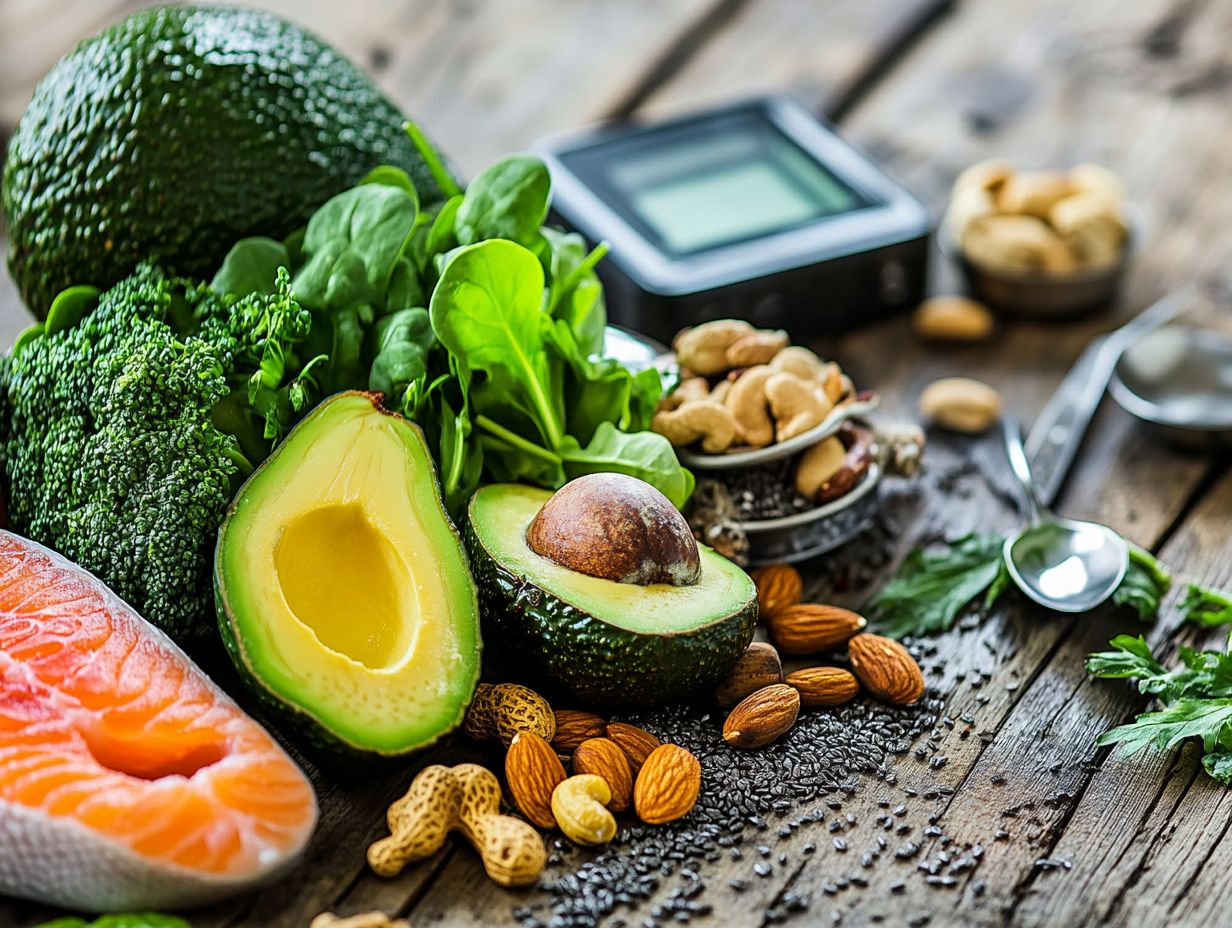
- The keto diet involves increasing healthy fat intake, limiting low carbohydrates, and moderating protein, leading to weight loss.
- Recommended foods on the keto diet include healthy fats, low-carb vegetables, and high-quality proteins, which aid in nutritional ketosis.
- The keto diet may offer benefits such as increased fat burning and improved insulin sensitivity, but it may also pose potential risks like nutrient deficiencies and difficulty sustaining long-term.
What is the Keto Diet?
The ketogenic diet, commonly known as the keto diet, is a carefully crafted low-carbohydrate, high-fat eating plan. It aims to induce nutritional ketosis.
In this metabolic state, your body shifts its primary energy source from glucose to fat.
This diet has captured considerable attention due to its promising health benefits. These benefits encompass weight loss, enhanced insulin sensitivity, and even specific therapeutic applications for conditions such as pediatric epilepsy, metabolic syndrome, and certain cancers.
Among the esteemed experts championing this structured approach to nutrition and overall well-being is Dr. Rachel Scherr. Her insights lend credibility to the diet’s potential impact on health and its treatment potential for various conditions.
How Does the Keto Diet Work for Weight Loss?
The keto diet helps you lose weight primarily by inducing nutritional ketosis. This is a state in which your body shifts its metabolic focus from burning glucose to burning fat.
This transition boosts the production of ketone bodies, which become your alternative energy source. As a result, you may experience appetite suppression, making it significantly easier to maintain a caloric deficit and reach your weight loss goals.
With lowered insulin levels, your body taps into its fat stores more efficiently. This promotes overall fat loss and healthy aging.
What Are the Nutritional Adjustments for Weight Loss on the Keto Diet?
To effectively promote weight loss on the keto diet, you’ll need to implement several strategic nutritional adjustments. These adjustments emphasize specific dietary proportions.
This approach prioritizes a high fat intake while significantly curtailing low carbohydrates. By making these dietary interventions, you can ensure that your energy needs are met predominantly through healthy fats.
This helps foster a state of nutritional ketosis while still providing essential nutrients. Typically, the dietary recommendations suggest that around 70-75% of your total calorie intake should come from fat sources, 20-25% from protein, and a mere 5-10% from carbohydrates.
1. Increase Healthy Fats
Increasing your intake of healthy fats is a crucial adjustment when embracing the ketogenic diet. These fats serve as vital energy reserves and facilitate your body s transition into nutritional ketosis. Incorporate sources like avocados, nuts, seeds, and olive oil all of which boast beneficial fatty acid profiles that enhance satiety and elevate overall nutritional quality, as outlined in the 2015 2020 Dietary Guidelines.
These healthy fats keep your energy levels steady and play a crucial role in supporting essential bodily functions. For example, avocados are rich in monounsaturated fats, which can help reduce inflammation and promote heart health. Nuts and seeds are packed with omega-3 and omega-6 fatty acids, contributing to brain function and hormonal balance.
Coconut oil, a favored option, contains medium-chain triglycerides (MCTs) that are rapidly metabolized into ketones, making them an ideal energy source during your ketogenic journey, according to research studies. Together, these fats create a nourishing environment that enhances the dietary framework necessary for effective fat burning and weight management.
2. Limit Carbohydrate Intake
Limiting carbohydrate intake is crucial when following the ketogenic diet, as it directly impacts glycemic control and enhances insulin sensitivity two vital elements for achieving and sustaining ketosis. Aim to lower your total carbohydrate consumption to below 50 grams per day, which can significantly transform your body’s energy metabolism.
By shifting your body s energy source from glucose to fat, you’re likely to experience more stable blood sugar levels, minimizing the risk of insulin spikes and crashes that often result from higher carbohydrate diets. This smart dietary move can make a real difference for those struggling with type 2 diabetes or prediabetes, as maintaining low carbohydrate levels promotes overall metabolic health and reduces chronic inflammation.
The physiological effects of reducing carbohydrate intake often encompass diminished hunger levels, improved fat oxidation, and potential weight loss. These outcomes contribute to healthier long-term results for individuals embracing low-carb lifestyles.
3. Moderate Protein Intake
Moderate protein intake is a crucial element of your ketogenic diet, enabling your body to maintain muscle mass while effectively promoting fat burning through ketone production. Dietary guidelines suggest that protein should constitute about 20-25% of your total caloric intake. This proportion allows for an adequate supply of amino acids without disrupting ketosis, which is vital for healthy aging.
This delicate balancing act not only helps preserve muscle but also plays a significant role in your overall health. Protein is essential for various bodily functions, including hormone regulation and immune support, according to the Dietary Reference Intakes.
As you navigate the keto diet, it’s essential to be mindful of your carbohydrate levels. Consuming too much protein can lead to gluconeogenesis, which occurs when your body converts excess protein into sugar. This not only jeopardizes your state of ketosis but may also adversely affect your total cholesterol levels and overall health.
Understanding the right amount of protein intake is pivotal for you. It ensures you meet your nutritional needs while fully enjoying the benefits of the ketogenic approach and avoiding possible adverse effects.
What Foods Should You Eat on the Keto Diet?

On the keto diet, it s essential for you to concentrate on foods abundant in healthy fats, low in carbohydrates, and rich in high-quality proteins. These choices are vital for supporting nutritional ketosis and enhancing your overall health, as recommended by various dietary guidelines.
By incorporating avocados, olive oil, leafy greens, and lean meats into your meals, you can craft a balanced and delectable dietary pattern that aligns seamlessly with ketogenic principles.
Start incorporating these incredible foods today to kickstart your journey to better health!
1. Healthy Fats
Healthy fats are the cornerstone of your ketogenic diet. They provide important energy to fuel your metabolic functions and help you lose weight. Embrace foods like avocados, nuts, seeds, and coconut oil as your allies; they are excellent sources of these fats. Incorporating them contributes to a nutritious and satisfying dietary pattern endorsed by the FDA and other health institutions.
When you include healthy fats such as olive oil and fatty fish in your meals, you enhance their flavor while introducing vital omega-3 and monounsaturated fats. These nutrients play a key role in reducing inflammation and promoting heart health. This not only elevates your dining experience but also supports healthy aging.
These fats are critical for energy production. They also support brain function and hormone regulation, making them crucial for anyone following a low-carbohydrate lifestyle. Including full-fat dairy and grass-fed meats in your diet complements this approach, ensuring a balanced intake that aligns with keto principles. This nourishes your body, leading to an overall sense of well-being and helping prevent chronic health problems.
2. Low-Carb Vegetables
Incorporating low-carb vegetables is essential on the ketogenic diet. These foods are packed with dietary fiber and vital nutrients while being low in carbohydrates and calories. Options like leafy greens, zucchini, and broccoli provide essential vitamins and minerals without disrupting your ketosis or causing keto flu symptoms.
These nutrient-dense choices support your digestive health and promote a sense of fullness. This makes it easier to stick to the dietary restrictions often required in keto. Low-carb vegetables also supply antioxidants, combating oxidative stress a common concern for those on a high-fat diet and managing metabolic disease.
By including a variety of these veggies in your meals, you can enhance your dishes with different textures and flavors. This makes healthy eating enjoyable and sustainable. It s clear that embracing low-carb vegetables is a pivotal strategy for optimizing your health on a ketogenic journey.
3. High-Quality Proteins
High-quality proteins are essential for your ketogenic journey. They play a crucial role in muscle maintenance and overall health especially if you’re managing metabolic syndrome or aiming for weight loss. Choose foods like grass-fed beef, free-range poultry, and wild-caught fish to ensure your protein intake is optimal.
These protein sources deliver essential amino acids that assist in rebuilding muscle tissue. This is especially advantageous for those who are active or engaged in strength training. Don’t overlook options like eggs, which are packed with healthy fats, or plant-based proteins like tempeh and nuts, accommodating various dietary preferences.
Choosing these selections not only supports your metabolic function but also helps keep hunger at bay. This is key for sustaining a ketogenic lifestyle. By emphasizing high-quality proteins, you can reap significant benefits in balancing your weight and enhancing overall wellness.
What Foods Should You Avoid on the Keto Diet?
Avoiding certain foods is just as crucial as knowing what to include in your keto diet. Especially when it comes to high-carb options that can obstruct your journey into ketosis.
Processed foods, sugary beverages, and grains are prime examples of items you should eliminate or significantly restrict to maintain your low-carb intake. Don’t miss out on these vital components of your diet!
1. High-Carb Foods
High-carb foods can be quite detrimental to your ketogenic diet, as they have the potential to spike your blood sugar and elevate insulin levels. These effects significantly hinder your body’s ability to enter and maintain ketosis. It s wise to strictly avoid foods like bread, pasta, and sugary snacks.
When you indulge in these carbohydrate-rich options, you set off rapid fluctuations in blood glucose that trigger an overproduction of insulin. This hormonal response complicates your journey into ketosis, where fat becomes your primary fuel source. Over time, it can also diminish your cells’ responsiveness to insulin, affecting overall health.
Elevated insulin levels can lead to increased fat storage, directly undermining the metabolic health goals that come with a well-executed ketogenic lifestyle.
Therefore, if you re aiming to enhance your overall health and boost your energy levels, prioritizing low-carb alternatives is essential for maintaining stable blood sugar levels.
2. Processed Foods
Processed foods are often laden with unhealthy fats, additives, and hidden sugars, making them ill-suited for your ketogenic diet. Not only do these foods contribute to excessive carbohydrate intake, but they can also lead to a range of health issues over time.
Committing to a ketogenic lifestyle means prioritizing whole foods for achieving your nutritional goals and maintaining overall wellness. Processed options usually lack essential nutrients, often substituting them with artificial ingredients that undermine your metabolic health.
By choosing unprocessed varieties loaded with healthy fats from sources like avocados, nuts, and olive oil, you can support your body’s natural functions and remain satisfied without deviating from your low-carb approach.
Ultimately, limit processed foods to significantly enhance your journey toward improved health and effective weight management.
3. Sugary Drinks
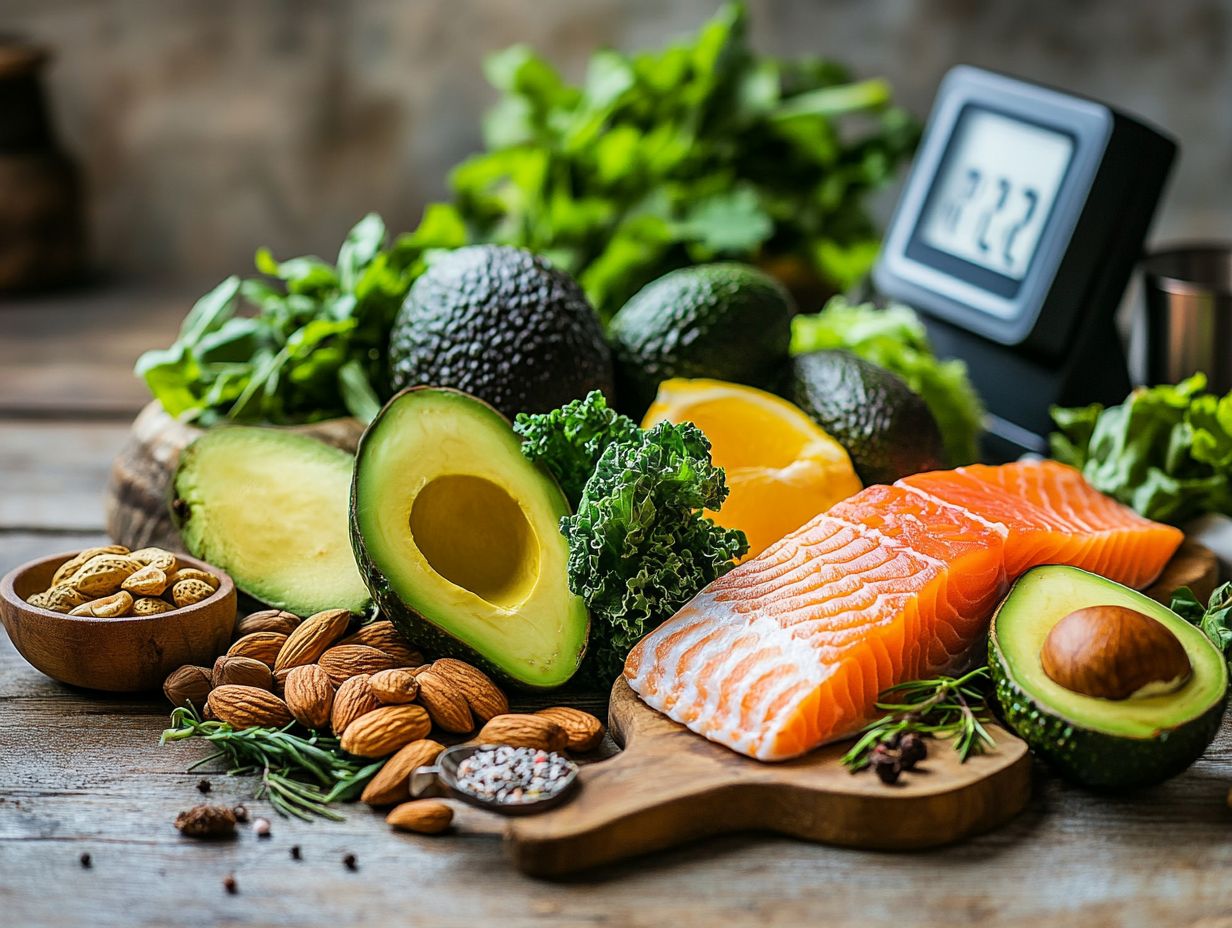
Sugary drinks are a hidden minefield of carbohydrates that you should steer clear of on your Keto Journey. These beverages can swiftly push you over your daily carbohydrate limit, throwing your glucose metabolism into disarray. Drinks like soda, sweetened teas, and energy drinks not only pack in unwanted calories but also lack any real nutritional value.
Indulging in these drinks can disrupt your body s ability to maintain ketosis and lead to unsettling spikes in blood sugar levels, which might compromise your insulin sensitivity over time. Furthermore, they can trigger cravings for other high-carb foods, making it increasingly difficult to stick to your dietary goals.
Instead, consider healthier alternatives like sparkling water, herbal teas, or homemade smoothies. These choices will keep you hydrated while fostering your overall well-being. By avoiding sugary drinks, you can enhance your metabolic state and pave the way for successfully achieving your ketogenic objectives.
What Are the Benefits of the Keto Diet for Weight Loss?
The ketogenic diet presents a wealth of advantages for weight loss, primarily by enhancing fat burning as your body shifts to utilizing fat stores for energy. This shift not only improves insulin sensitivity but can also lead to lower blood sugar levels, significantly reducing the risk of chronic diseases.
The anti-inflammatory properties inherent in the keto diet may also play a crucial role in alleviating chronic inflammation, thereby bolstering your overall health and well-being.
Start your Keto adventure today! Ditch the high-carb foods, embrace whole food choices, and discover how simple dietary adjustments can lead to a healthier lifestyle!
1. Increased Fat Burning
One of the standout benefits of the ketogenic diet is its ability to increase fat burning. As you enter a state of ketosis, your body becomes adept at utilizing fat as its primary energy source. This shift aids in weight loss and lowers the risk of diseases caused by high carbohydrate intake.
During ketosis, your liver converts fatty acids into ketones, which then act as an alternative energy source for your cells, helping to conserve glucose levels. This metabolic adjustment encourages your body to tap into stored fat, significantly boosting fat oxidation. By minimizing the insulin spikes often triggered by carbohydrate intake, the keto diet helps stabilize your blood sugar levels, leading to better energy utilization and enhanced overall metabolic health.
This approach not only helps you manage your weight but also lowers your risk of conditions such as obesity, type 2 diabetes, and other health issues associated with an imbalanced diet.
2. Improved Insulin Sensitivity
Improved insulin sensitivity stands out as a noteworthy benefit of the ketogenic diet, helping to stabilize your blood sugar levels while significantly reducing the risk of developing type 2 diabetes. By limiting your carbohydrate intake, this diet minimizes those pesky insulin spikes, fostering better glucose metabolism and enhancing your overall metabolic health.
Adopting a low-carb ketogenic diet can lead to fewer blood sugar fluctuations. This stability is particularly crucial if you’re managing diabetes or looking to prevent it. Enhanced insulin sensitivity enables your body to utilize insulin more effectively, transforming glucose into energy rather than letting it linger and get stored as fat.
This dietary strategy also supports your weight loss efforts, a key component in improving metabolic health. Consequently, you may find yourself not only regulating your blood sugar levels more effectively but also achieving a healthier body composition. Together, these benefits work to reduce the likelihood of insulin resistance a condition where the body’s cells don’t respond well to insulin, leading to higher blood sugar levels and other complications associated with diabetes, paving the way for a healthier you.
3. Reduced Appetite and Cravings
The ketogenic diet is widely recognized for its ability to reduce appetite and cravings, a significant advantage for anyone aiming to shed some pounds. When you enter nutritional ketosis, your hunger hormones undergo a transformation, promoting feelings of fullness that make it much easier to stick to your dietary goals without those nagging hunger pangs.
This remarkable effect primarily stems from changes in hormones like ghrelin and leptin, which are essential for signaling hunger and satiety. As your body shifts into ketosis, you ll likely notice a decrease in ghrelin levels, which curbs your urge to snack between meals. Concurrently, improved leptin sensitivity helps regulate your energy balance more effectively.
Additionally, the high-fat intake that comes with the keto diet boosts the production of ketones, further enhancing your sense of satiation. As a result, you may experience natural appetite suppression, which is crucial for successful weight management. This gives you the power to make healthier food choices and maintain a calorie deficit with greater ease and comfort.
What Are the Potential Risks of the Keto Diet?
While the ketogenic diet presents a wealth of health benefits, it’s imperative to remain mindful of the potential risks and challenges that may arise during its implementation. These can include nutrient deficiencies if the diet is not properly managed, the common ‘keto flu’ symptoms that many experience during the initial adaptation phase, and a heightened risk of kidney stones for those who are predisposed.
By being aware of these risks, you can adopt a more informed and safer approach to this dietary regimen, ensuring that you reap the rewards without unnecessary complications.
Are you ready to try the keto diet and see its benefits for yourself?
1. Nutrient Deficiencies
Nutrient deficiencies can emerge on the ketogenic diet if you don t carefully follow dietary guidelines and ensure a well-rounded intake of essential vitamins and minerals. Without careful planning and diet oversight, the elimination of certain food groups may lead to a shortage of crucial nutrients, ultimately impacting your overall nutrition and health.
Consider that magnesium, potassium, and sodium are often at risk of deficiency, which can manifest in uncomfortable symptoms such as fatigue, muscle cramps, and even heart palpitations. To effectively combat these potential nutritional shortfalls, try adding low-carb vegetables like spinach and avocados into your meals; they are rich in these vital nutrients.
Incorporating bone broth or electrolyte supplements helps maintain a proper mineral balance. Following proper dietary recommendations can support overall health.
It is essential to remain aware of these eating tips as you embrace a ketogenic lifestyle, as they play a pivotal role in preventing health issues and ensuring your body functions at its best.
2. Keto Flu: Symptoms and Management
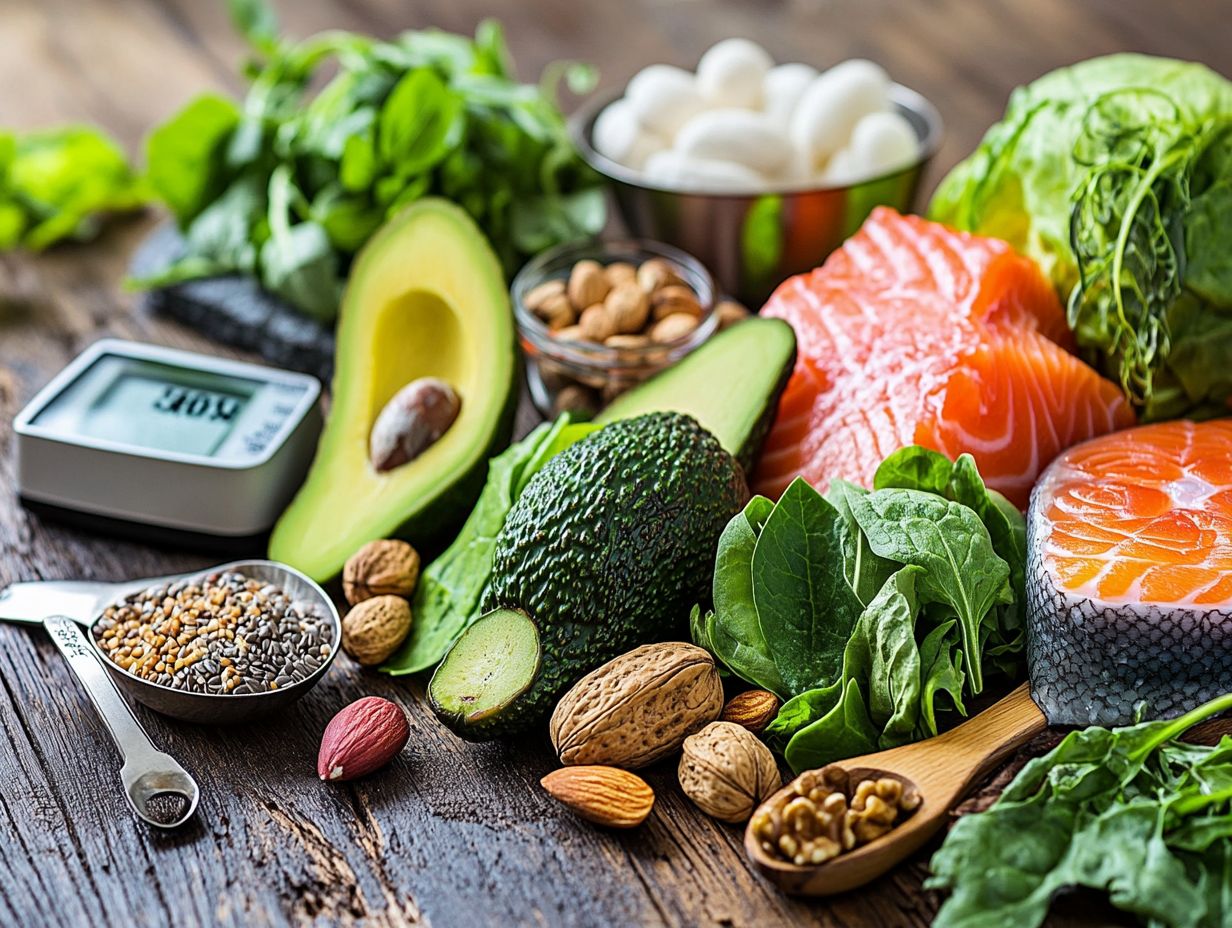
The term ‘keto flu’ describes a range of symptoms you might encounter during the initial phase of adapting to the ketogenic diet. You may experience:
- Fatigue
- Headaches
- Irritability
- Nausea
- Brain fog
- Muscle cramps
This adjustment period lasts from a few days to a couple of weeks. It’s crucial during this time to prioritize hydration and consider boosting your electrolyte intake; doing so can significantly ease many of the uncomfortable symptoms tied to keto flu. Incorporating dietary interventions such as increasing dietary fiber can also be beneficial.
Incorporating low-carb vegetables and high-quality fats into your meals can further facilitate a smoother transition. Emphasizing a very-low-carbohydrate diet can also accelerate the adjustment process. By being aware of the potential hurdles and taking proactive measures to support your body s adaptation, you can minimize the effects of keto flu and set yourself up for a successful ketogenic journey.
3. Difficulty Sustaining Long-Term: Challenges and Solutions
Maintaining the ketogenic diet can be tough, given its restrictive nature and the social implications of steering clear of certain foods. This struggle can easily lead you back to your previous eating patterns, resulting in weight regain and the accompanying health issues. This is why dietary supervision and tracking macros are essential to maintaining progress.
The pressure to fit in during social gatherings, where carb-heavy meals are the norm, often leaves you feeling isolated and frustrated. Psychological factors, like cravings for those forbidden foods and a sense of deprivation, can seriously undermine your motivation. Understanding the health benefits can help you stay motivated, as well as its potential in the treatment of obesity and type 2 diabetes.
To navigate this lifestyle more effectively, consider strategies such as meal prepping and discovering keto-friendly alternatives to your favorite snacks. Building a support network whether through online communities or local groups can also be instrumental in providing accountability and encouragement, making it easier for you to tackle the challenges that come with adhering to a ketogenic lifestyle. Additionally, for those new to this way of eating, understanding keto and nutritional adaptations for beginners can be very helpful. Research studies have shown that having a support system can significantly improve adherence and long-term success.
For more information on the ketogenic diet, consult resources like FDA guidelines or info sheets from reputable health organizations.
Frequently Asked Questions
What is the Keto diet and how does it aid in weight loss?
The Keto diet is a high-fat, moderate-protein, and low-carbohydrate eating plan that forces the body to burn fat instead of carbohydrates for energy. This process, known as ketosis, can lead to weight loss due to the body using stored fat as fuel. Additionally, the diet’s effect on insulin sensitivity and glycemic control can further support weight loss and overall metabolic health.
Start your ketogenic journey today and share your success stories with us!
Can anyone try the Keto diet?
The Keto diet can effectively promote weight loss. However, it isn’t suitable for everyone. People with certain medical conditions, such as diabetes or kidney disease, should consult their doctor before starting the diet. Be sure to consult a healthcare professional to make informed dietary choices!
Additionally, those considering the diet for specific health issues like pediatric epilepsy or cancer treatment should seek specialized medical advice.
What are some nutritional adjustments that need to be made for a successful Keto diet?
The Keto diet involves eliminating or severely limiting carbohydrates, so it’s crucial to compensate for those missing nutrients with other sources. Incorporating foods high in healthy fats, protein, and essential vitamins and minerals, such as avocados, nuts, and leafy greens, is vital for a balanced Keto diet.
Ensuring adequate dietary proportions and meeting the Dietary Reference Intakes for adults, adolescents, and children is essential for healthy aging and overall wellbeing.
Is it necessary to track macros on the Keto diet?
Tracking “macros,” or macronutrients, is an important aspect of the Keto diet. It helps ensure your body is in a state of ketosis and that you are consuming the correct ratio of fats, proteins, and carbohydrates. Tracking also helps with portion control and can aid in weight loss.
Moreover, it helps monitor ketone bodies and maintain optimal insulin levels. Start tracking today!
Are there any potential side effects of the Keto diet?
As with any significant change in diet, side effects may occur when starting the Keto diet. These can include headaches, fatigue, and gastrointestinal issues. However, these symptoms usually subside after a few weeks as the body adjusts to the new eating plan.
Long-term adverse effects may include kidney stones, changes in bone density, and issues with blood sugar levels.
How do I maintain weight loss after following the Keto diet?
While the Keto diet can be an effective way to lose weight, it’s important to have a plan for maintaining weight loss after reaching your goal. This may include gradually reintroducing carbohydrates into your diet, continuing to track macros, and finding a balance that works for your body and lifestyle.
Research studies suggest that maintaining metabolic health and balanced dietary patterns are key for long-term success. Don’t wait consult with your doctor now!

